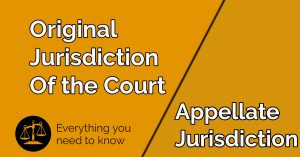The court of appeal is very important in the hierarchy of courts in Nigeria because cases does not usually move to the Supreme Court without passing through it, except where the case falls under the original Jurisdiction of the Supreme Court. In this article, we will be discussing the original and appellate jurisdiction of the Court of Appeal in Nigeria. I strongly recommend that you read this work till the end because you are going to learn those cases where the Court of Appeal has original jurisdiction and cases where it has appellate jurisdiction.
The judiciary is the third arm of government as established by section 6 of the 1999 constitution of Nigeria, whose sole aim is the unbiased serving of justice to the people while acting as the last hope of a common man. That same section of the constitution provides the courts of record in a hierarchical order. They include the following:
- The supreme court;
- The court of appeal;
- Federal high court;
- The national industrial court;
- The high court if the federal capital territory;
- A high court of the state;
- The sharia court of appeal of the federal capital territory;
- Sharia court of appeal of a state;
- The customary court of appeal of the FCT;
- Customary court of appeal of a state; and such other courts as the national or house of assemblies may make law.

Establishment Of The Court Of Appeal In Nigeria
The court of appeal was established by section 237 of the 1999 constitution. It court came into being for the interest of justice in order to help in adjudicating issues to enhance harmonious coexistence. Furthermore, the court of appeal is the second highest court of the federation. This means that, in terms of superiority, it immediately comes after the Supreme Court. Court of Appeal has the right to receive appeals from every other court in the country while at the same time exercising its original jurisdictional functions.
Section 237 which established the court made provisions for the position of a president as the head of the court while consisting not less than forty-nine justices of which not less than three are compulsorily required to be learned in Islamic personal law, and not less than three also required to be learned in customary law. Also, the appointment of a person to the office of the court of appeal shall be made by the president upon the recommendation of the national judicial council to be approved by the senate as provided for in section 238 of the constitution.
The same section made provision for the appointment of a person in to the office of a justice of the court; same requiring an appointment by the president of the federation upon the recommendation of the National Judicial Council (NJC). With all these appointments and ratifications, a person is not legally fit to be recommended for the office of a court of appeal justice unless, he had practiced as a legal practitioner in Nigeria for a period not less than 12years as stated in section 238(3) of the 1999 constitution of Nigeria
Also see:
- Appellate jurisdiction of the supreme court of Nigeria
- Advantages and Disadvantages of one party system
- Why women don’t participate in politics: See why
- Exceptions to privity of contract rule
- Exceptions to the rule in pinnel’s case
Original and appellate Jurisdiction of the Court of Appeal of Nigeria Explained
1. Original jurisdiction: Original jurisdiction of the court of appeal refers to those instances where the court has exclusive right to be the first court to sit on a particular matter. This means that the matter did not come to it from any lower court of law. The original jurisdictions of the court of appeal are enshrined in section 239(1) of the constitution and these include: having the power to hear and determine:
(a) Whether any person has been validly elected to the office of the president or vice president under the constitution; or
(b) Whether the term of office of the president or vice president has ceased; or
(c) Whether the office of the president or vice president has become vacant.
It is clear from the aforementioned that the court of appeal sitting as a presidential election petition tribunal, has the sole power as the court of first instance, to determine whether a person is duly and validly elected as the president or vice president of Nigeria.
This is seen in the case of Atiku Abubakar v INEC ((LER [2019] CA/PEPC/002/2019)). It also determines whether the tenure of a president or vice president has ceased and whether such offices are vacant ((Attorney General of Federation v Atiku (2007) ALL FWLR (PT 375) 1264 AT 1289(CA))). It is important to note that the constitution did not confer original jurisdiction to the court of appeal as to the determination of a criminal matter whatsoever.
Also read:
2. Appellate jurisdiction of the Supreme Court: Appellate jurisdiction of the court of appeal refers to those circumstances where the court sits on cases or matter brought to it from lower courts. This could be matters coming from the Federal High Court or State High Court. Consequently, the 1999 constitution of Nigeria makes provision for the appellate jurisdictions of the court of appeal in section 240. It states;
“subject to the provisions of this constitution, the court of appeal shall have jurisdiction to the exclusion of any other court of law in Nigeria, to hear and determine appeals from the federal high court, the high court of the FCT, high courts of states, sharia court of appeal of the FCT, sharia court of appeal of a state, customary court of appeal of the FCT, customary court of appeal of a state, decisions of a court martial, or other tribunal as may be prescribed by an act of the national assembly”.
It is trite from the provisions of section 240, that the court of appeal has the authority to entertain both criminal and civil matters accruing from any of those courts aforementioned. However, appeals can lie from those courts to the court of appeal in two forms (as of right or by leave of court).
Section 241(1) of the 1999 constitution also provides instances where appeals can lie as of right from the federal high court or state high courts to the court of appeal. Such instances includes:
(a) Final decisions in any civil or criminal proceeding before the federal high court or a high court sitting at first instance.
(b) Where the ground of appeal involves questions of law alone on decisions in any civil or criminal proceedings.
(c) Decisions in any civil or criminal proceedings on questions as to the interpretation or application of the constitution.
(d) Decisions in any civil or criminal proceedings on questions as to whether any of the provisions of the chapter iv of the constitution has been or is being or is likely to be contravened in relation to any person.
(e) Decision in any criminal proceeding in which the federal high court or a high court has imposed a death sentence
(f) Decisions made or given by the federal high court or a high court
(g) Where the liberty of a person or the custody of an infant is concerned
(h) Where the injunction or other appointment of a receiver is granted or refused,
(I) In the case a decision determining the case of a creditor or the liability of a contributory or other officer under any enactment relating to companies in respect of misfeasance or otherwise,
(j) In the case of a decree nisi in a matrimonial cause or a decision in an admiralty action
(k) In such other cases as may be prescribed by any law in force in Nigeria.
Furthermore, sections 242, 243, 244, 245 and 246 of the same constitution makes other provisions where appeals could be as of right or leave to the court of appeal.

Also read:
- Methods of controlling delegated legislation
- 7 reasons why indirect rule failed in the east
- Causes, Effects and Solutions to Brain drain in Nigeria
- Fundamental human rights in the 1999 constitution of Nigeria
- Ways of Acquiring citizenship in Nigeria
In conclusion, it is pertinent to note that for the court of appeal to have jurisdiction and perform its functions or sit on matters as stipulated in the constitution, it must be duly constituted. That means that the number of justices present must tally with the provisions of section 247 of the constitution. This section provides that, the court shall be duly constituted if three (3) justices of the court are present. And if the case at hand is a customary matter or Islamic matter, then three justices learned in those laws.

Edeh Samuel Chukwuemeka, ACMC, is a lawyer and a certified mediator/conciliator in Nigeria. He is also a developer with knowledge in various programming languages. Samuel is determined to leverage his skills in technology, SEO, and legal practice to revolutionize the legal profession worldwide by creating web and mobile applications that simplify legal research. Sam is also passionate about educating and providing valuable information to people.